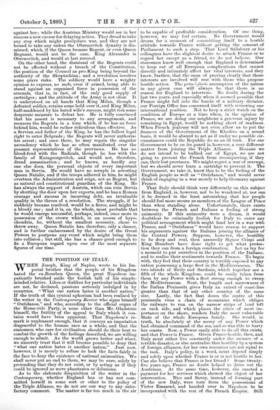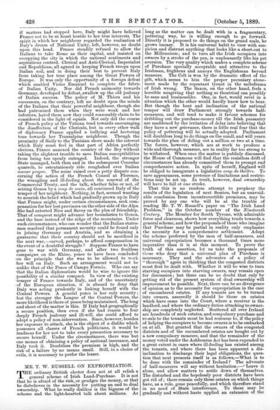Tag POSITION OF ITALY.
WHEN Joseph, King of Naples, wrote to his Im- perial brother that the people of his Kingdom hated the ex-Bourbon Queen, the great Napoleon im- patiently brushed aside the foolish talk of his simple- minded relative. Likes or dislikes for particular individuals are not, he declared, passions seriously indulged in by countries. " What one nation hates is another nation." If the truth of this cynical aphorism had been realised by the writer in the Contemporary Review who signs himself " Outidanos," and who, according to the official organ of the Home-rule Party, is none other than Mr. Gladstone himself, the futility of the appeal to Italy which it con- tains would have been apparent. That Napoleon's re- mark is unpleasant enough, that it conveys an imputation disgraceful to the human race as a whole, and that the statesmen who care for civilisation should do their best to combat the growth of the feelings described, we are willing enough to admit. As the world grows better and wiser, we sincerely trust that it will become possible to deny that "what one nation hates is another nation." Just now, however, it is merely to refuse to look the facts fairly in the face to deny the existence of national animosities. We shall never put an end to them,-we may be sure, solely by pretending that they do not exist, or by acting as if they could be ignored as mere phantasies or delusions.
As to the elaborate disquisition of the writer in the Contemporary, whether England has or has not com- mitted herself in some sort or other to the policy of the Triple Alliance, we do not see our way to any satis- factory comment. The matter is far too much in the air to be capable of profitable consideration. Of one thing, however, we may feel certain. No Government would dream for a moment of committing itself to a hostile attitude towards France without getting the consent of Parliament to such a step. That Lord Salisbury or his colleagues have the slightest desire to attack France or to regard her except as a friend, we do not believe. Our statesmen know well enough that England is determined to keep out of all European complications that cannot directly and intimately affect her vital interests, and they know, further, that the onus of proving clearly that those interests are involved will rest with those who propose hostile action. The primd-facie assumption of the nation in any given case will always be that there is no reason for England to intervene. No doubt during the last two years, and especially when it seemed possible that France might fall into the hands of a military dictator, our Foreign Office has concerned itself with reviewing our international position. Not to keep a strict watch on the condition of Europe at a time when, in the opinion of France, we are doing our neighbour a grievous injury by remaining in Egypt, would be nothing short of madness. When French jealousy will not even allow us to put the finances of the Government of the Khedive on a sound basis, it would be absurd to act as if under no possible cir- cumstances could the Republic do us an ill turn. For our Government to be on its guard is, however, a very different matter from joining the Triple Alliance. Because we do not intend to be bullied out of Egypt, we are not going to prevent the French from reconquering, if they can, their lost provinces. We might regret a war of revenge, but we should never burn a cartridge to prevent it. The Government, we take it, know this to be the feeling of the English people as well as " Outidanos," and would never think of engaging in a war merely to help Germany against France.
That Italy should think very differently on this subject from England, is, however, not to be wondered at, nor can it be deemed in the least astonishing that her people should feel more secure as members of the League of Peace than when standing alone. Unfortunately, there exists between the French and Italians a feeling of strong animosity. If this animosity were a dream, it would doubtless be criminally foolish for Italy to enter any political arrangement which might land her in a war with France, and " Outidanos " would have reason to support his arguments against the Italians joining the alliance of the Central Powers. Suppose, however, the hostility to be deep and real, then assuredly Signor Crispi and King Humbert have done right to get what proteo- tion they can from a foreign combination. Let us try for a moment to put ourselves in the position of the Italians, and to realise their sentiments towards France. To begin with, they feel that their country is terribly exposed to any nation possessing a large fleet in the Mediterranean. The two islands of Sicily and Sardinia, which together are a fifth of the whole Kingdom, could be easily taken from them by any Power with a fleet strong enough to sweep the Mediterranean. Next, the length and narrowness of the Italian Peninsula gives Italy an extent of coast-line greater than that of any other country of the same size. Lastly, the fact that down the centre of this peninsula runs a chain of mountains which obliges the railways to run on the narrow strips of land left on each side, and which places the cities of most im- portance on the shore, renders Italy the most vulnerable State of the whole European family. She would, in truth, be absolutely at the mercy of any Power• which had obtained command of the sea, and so was able to harry her coasts. Now, a Power easily able to do all this exists, and that Power is France. Given France hostile, then, and Italy must either live constantly under the menace of a terrible disaster, or else neutralise that hostility by a system of foreign alliances, for her own resources are not equal to the task. Italy's policy, in a word, must depend simply and solely upon whether France is or is not hostile to her. Can she believe that France is her friend ? Some twenty- five years ago, France no doubt helped to drive out the Austrians. At the same time, however, she exacted a payment for her services which showed the object of her intervention. Nice and Savoy, instead of forming part of the new Italy, were torn from the possessions of Victor Emanuel, and handed over to Napoleon to be incorporated• with the rest of the French Empire. Still if matters had stopped here, Italy might have believed France not to be at heart hostile to her true interests. The spirit in which her neighbour regarded the realisation of Italy's dream of National Unity, left, however, no doubt upon this head. France steadily refused to allow the Italians to take Rome as their capital, and insisted on occupying the city in which the national sentiments and aspirations centred. Clerical and Anti-Clerical, Imperialist and Republican, all agreed in keeping French troops upon Italian soil, and in doing their best to prevent Italy from taking her true place among the Great Powers of Europe. It was only the opportunity of a foreign defeat which enabled Victor Emanuel to complete the fabric of Italian Unity. Nor did French animosity towards Germany, developed by defeat, swallow up the old jealousy of Italian success. The policy of M. Thiers and his successors, on the contrary, left no doubt upon the minds of the Italians that their powerful neighbour, though she had patronised them when they were weak and her inferiors, hated them now they could reasonably claim to be considered in the light of equals. Not only did the course of French policy at the Vatican tend towards encouraging the disaffection of the Clericals, but in every other walk of diplomacy France applied a bullying and hectoring tone towards her Transalpine neighbour. Though the proximity of Sicily to the Tunisian shore made the interest which Italy must feel in that part of Africa perfectly obvious, France annexed the country of the Bey without taking the slightest trouble to save Italian susceptibilities from being too openly outraged. Indeed, the stronger State managed, both then and in the subsequent Consular quarrels, to ostentatiously ride roughshod over Italian • amour propre. The noise raised over a petty dispute con- cerning the action of the French Consul at Florence, the wrangling and ill-feeling about the renewal of the Commercial Treaty, and the talk, whether false or not, of seizing Genoa by a coup de main, all convinced Italy of the temper of her neighbour. Nothing, in fact, seemed wanting to nourish the belief which had gradually grown up in Italy that France might, under certain circumstances, seek com- pensation for her lost provinces on the other side of the Alps. She had extorted Nice and Savoy on the plea of friendship. That of conquest might advance her boundaries to Genoa, and the base instead of the ridge of the mountains. Under such circumstances, who can wonder that the Italian states- men resolved that permanent security could be found only in joining Germany and Austria, and so obtaining a guarantee that their country should not be sacrificed in the next war,—carved, perhaps, to afford compensation in the event of a doubtful struggle ? Suppose France to have gone to war with Germany, and after two fruitless campaigns on the Rhine, peace to have been concluded on the principle that she was to be allowed to work her will on Italy. Such an arrangement would not be unlike that of the Peace of Campo Formio. Who can say that the Italian diplomatists would be wise to ignore the Tossibility of a similar compact. In view of the existing temper of France towards Italy, and of the uncertainty -of the European situation, it is absurd to deny that Italy was acting prudently in linking herself with the Central Powers. A general peace is her only security ; -but the stronger the League of the Central Powers, the more likelihood is there of peace being maintained. The long and short of the matter is this. If Italy had geographically a secure position, then even if she had reason to fear deeply French jealousy and she could afford to adopt a policy of non-intervention. Since, however, besides her exposure to attack, she is the object of a dislike which possesses all classes of French politicians, it would be madness for her not to take every precaution necessary to secure herself. Under the circumstances, there was but one means of obtaining a policy of national insurance, and Italy took it. Doubtless the premium is high, and the risk of a failure by no means small. Still, in a choice of evils, it is necessary to prefer the lesser.







































 Previous page
Previous page